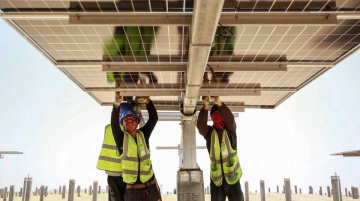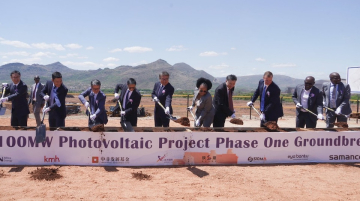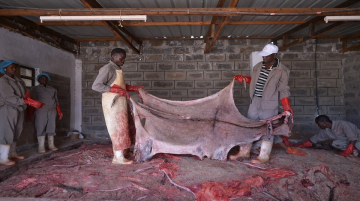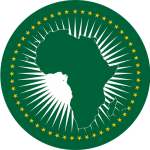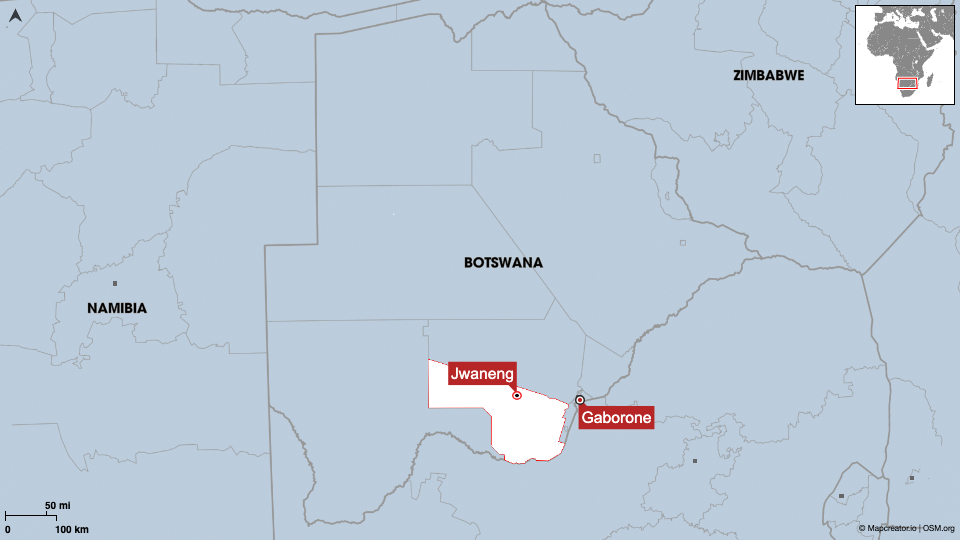
A Chinese consortium, Sinotswana Green Energy, is building a 100MW solar plant in Jwaneng, one of Botswana’s diamond mining towns some 170 kilometers west of the capital, Gaborone.
The two Chinese members of this consortium are China Harbor Co Ltd (CHEC) and China Water and Electric Development Co. working alongside local investors on the project that will be commissioned in the second quarter of 2026.
Both Chinese companies are subsidiaries of the China Communications Construction Company Ltd., which is currently ranked 63rd of the world’s largest corporations by the Fortune Global 500.
The consortium will finance the engineering, procurement, and construction (EPC) contract valued at $78.3 million. It will then operate and maintain the project for 25 years before handing it over to the government.
This financing arrangement means that the Southern African nation is not getting additional debt from China. As of November last year, Botswana had not borrowed from the Asian country since 2010 and in 2020, it was exempted from paying a $2 million interest free loan to support economic development and reduce the debt burden during the COVID-19 pandemic.
The Jwaneng solar plant is part of the government’s plan to increase renewable energy generation to 50% of demand by 2036. In May last year, the Botswana Power Corporation issued the tender for the project, and the agreement was signed in August of this year.
President Mokgweetsi Masisi attended the event and said the signing marked a key milestone in the country’s energy transition.
He added that the initiative aligns with Botswana’s energy goal of providing adequate, affordable, and reliable energy supply for sustainable development.
Botswana Power Corporation and Sinotswana Green Energy representatives when they signed a power purchase agreement (PPA) in Jwaneng, Botswana, on August 12, 2024. Image / Xinhua
Masisi said that transitioning to renewable energy is imperative for mitigating climate change, decarbonizing Botswana’s mining industry, and exporting surplus energy.
Solar energy is ideal in Botswana because the country experiences some of the world’s highest sunshine levels annually. Lan Yuqiang, the commercial counselor at the Chinese embassy in the country who conducts trade and economic relations between the two countries, called for further Chinese investment in new energy industries.
As of 2021, Botswana’s electricity from solar was a paltry 94GW, less than one percent of the country’s coal-dominated production. The country also generates some of its energy from oil, while imports from neighboring countries fill the deficit.
Like Botswana, many African countries struggle to provide reliable electricity to their citizens. With the upcoming Forum on China-Africa Cooperation summit on September 4th in Beijing, energy issues are expected to rank high on the agenda.
Most African countries face chronic power shortages that are increasingly exacerbated by the effects of climate change.
The shift to renewable energy across the continent is heavily dependent on the availability of funds, which are largely limited. This means that foreign investors like the Chinese consortium in Botswana have an opportunity to help narrow the energy access gap, where an estimated 600 million people do not have reliable power.



